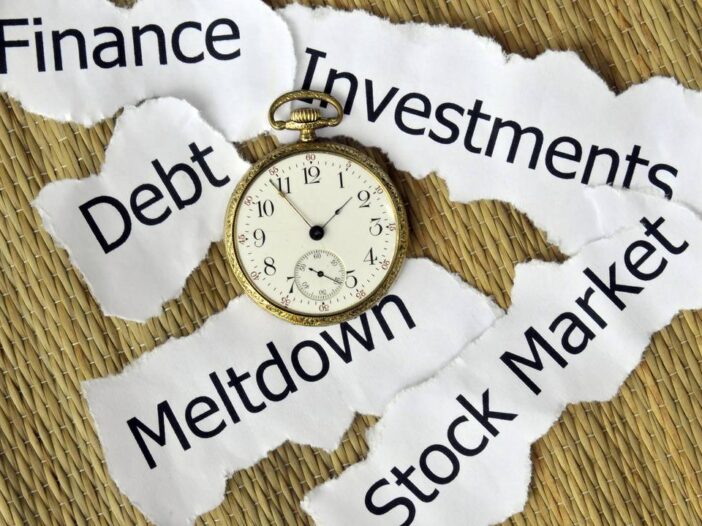You’ve seen the news. China’s Evergrande is the new Lehman Brothers. COVID has surged in nations with high vaccination rates like Seychelles, Iceland, Israel, Bermuda, and Singapore. Many of them were forced to reintroduce restrictions after declaring they’d live with COVID. Compliance with lockdowns is falling fast all around the world. Gas and electricity prices are causing crises in Europe. The iron ore price is plunging, worsening Australia’s terms of trade. The US’s debt ceiling is back on the agenda.
So, there’s no shortage of flashpoints right now. Things that could cause meltdowns in the stockmarket, or worse, the bond market. At least, in normal circumstances they might…
But today, instead of investigating the many possible crises, I’d like to ask whether you think there can even be a crisis anymore. Specifically, whether central banks and governments will prevent one.
For example, when people ask whether Evergrande is China’s Lehman Brothers, they are likely missing the point. What made Lehman Brothers so important is that it was allowed to fail. But what is the lesson to be learned from this? Is it that markets can plunge when the likes of Lehman Brothers or Evergrande fail?
I don’t think so…
I think the real lesson is that nothing since Lehman Brothers was allowed to fail. Because the failure of that investment bank caused a much bigger crisis.
So, do you think anyone will be making the same policy mistake anytime soon?
I doubt it.
Most of the time, anyway…
Because the lesson of Lehman Brothers was to not allow anything to fail in the first place. At least, not in an uncontrolled manner which risks contagion.
But what if the crisis is just too big, I hear you ask?
Well, we’ve also learned that the central banks and governments’ capability to prevent a crisis is nigh on unlimited. Actually, it is unlimited, in a particular sense we’ll get to below.
Do you think the Evergrande crisis is worse than the last 18 months of pandemic mayhem? I doubt it very much.
Stocks, bonds, real estate, and other investment assets have soared during a pandemic that shut down global travel and economies. Well, the lockdowns did the shutting down…
Similarly, GDP has recovered in many places, despite continuing restrictions and COVID cases. Think about that for a moment. It’s bizarre.
How to Survive Australia’s Biggest Recession in 90 Years. Download your free report and learn more.
Meanwhile, gold — the asset that outperforms when you can’t trust the monetary, financial, or economic system — has fallen. This usually signals rising trust in the system.
Look back at financial markets and you’d think the pandemic ended way back in mid-2020.
You’ve seen the news. China’s Evergrande is the new Lehman Brothers. COVID has surged in nations with high vaccination rates like Seychelles, Iceland, Israel, Bermuda, and Singapore. Many of them were forced to reintroduce restrictions after declaring they’d live with COVID. Compliance with lockdowns is falling fast all around the world. Gas and electricity prices are causing crises in Europe. The iron ore price is plunging, worsening Australia’s terms of trade. The US’s debt ceiling is back on the agenda.
So, there’s no shortage of flashpoints right now. Things that could cause meltdowns in the stockmarket, or worse, the bond market. At least, in normal circumstances they might…
But today, instead of investigating the many possible crises, I’d like to ask whether you think there can even be a crisis anymore. Specifically, whether central banks and governments will prevent one.
For example, when people ask whether Evergrande is China’s Lehman Brothers, they are likely missing the point. What made Lehman Brothers so important is that it was allowed to fail. But what is the lesson to be learned from this? Is it that markets can plunge when the likes of Lehman Brothers or Evergrande fail?
I don’t think so…
I think the real lesson is that nothing since Lehman Brothers was allowed to fail. Because the failure of that investment bank caused a much bigger crisis.
So, do you think anyone will be making the same policy mistake anytime soon?
I doubt it.
Most of the time, anyway…
Because the lesson of Lehman Brothers was to not allow anything to fail in the first place. At least, not in an uncontrolled manner which risks contagion.
But what if the crisis is just too big, I hear you ask?
Well, we’ve also learned that the central banks and governments’ capability to prevent a crisis is nigh on unlimited. Actually, it is unlimited, in a particular sense we’ll get to below.
Do you think the Evergrande crisis is worse than the last 18 months of pandemic mayhem? I doubt it very much.
Stocks, bonds, real estate, and other investment assets have soared during a pandemic that shut down global travel and economies. Well, the lockdowns did the shutting down…
Similarly, GDP has recovered in many places, despite continuing restrictions and COVID cases. Think about that for a moment. It’s bizarre.
Meanwhile, gold — the asset that outperforms when you can’t trust the monetary, financial, or economic system — has fallen. This usually signals rising trust in the system.
Look back at financial markets and you’d think the pandemic ended way back in mid-2020.
Until next time,
 |
Nickolai Hubble,
Editor, The Daily Reckoning Australia Weekend
PS: Our publication The Daily Reckoning is a fantastic place to start your investment journey. We talk about the big trends driving the most innovative stocks on the ASX. Learn all about it here.

